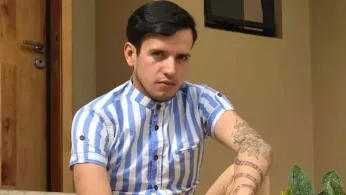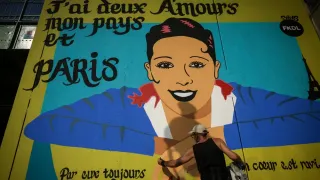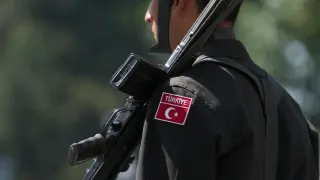
9 hours ago
Gay Asylum Seeker Andry Hernández Romero Released in Prisoner Swap, Remains at Risk After U.S. Disappearance
READ TIME: 3 MIN.
Andry Hernández Romero, a Venezuelan gay makeup artist, legally entered the United States in 2024 seeking asylum from anti-LGBTQ+ violence and political persecution in his home country . After following all required procedures and presenting himself at a port of entry, Hernández Romero was detained at the Otay Mesa Detention Center on the U.S.-Mexico border while awaiting his asylum claim’s adjudication. In December 2024, the Immigrant Defenders Law Center began representing him on a pro bono basis .
However, in March 2025, Hernández Romero was abruptly “disappeared” by the Trump administration. Legal advocates and his family were left in the dark, receiving no information about his whereabouts for months. According to Melissa Shepard, legal services director at Immigrant Defenders Law Center, “We say ‘disappeared’—‘disappeared to El Salvador’—because that’s essentially what it is.” The only evidence of his location came from images showing him being abused in El Salvador’s CECOT prison, a facility notorious for alleged human rights abuses .
Hernández Romero was one of at least 238 Venezuelans reportedly transferred to CECOT under a U.S. policy that sent certain asylum seekers to El Salvador, in violation of international norms and without due process . Advocacy groups, including the Immigrant Defenders Law Center, raised alarms over his well-being, citing concerns about the treatment of LGBTQ+ individuals in CECOT and the lack of transparency from both U.S. and Salvadoran authorities .
During his months in El Salvador, Hernández Romero’s family and attorneys were denied contact. His mother, Alexis Romero, shared her anguish in a recent interview: “They stepped on him, ran him over, completely shut down his dream. Now what is my boy going to do?” .
On July 18, 2025, Hernández Romero was released from CECOT as part of a broader prisoner swap between the United States and Venezuela . Yet, instead of being returned to the United States or a third country where his safety as an LGBTQ+ person might be assured, Hernández Romero was sent back to Venezuela. Advocates have expressed grave concern for his future, given the well-documented risks facing LGBTQ+ individuals in Venezuela, including discrimination, violence, and lack of legal protections .
Melissa Shepard, speaking on behalf of Immigrant Defenders Law Center, stated, “After months in El Salvador’s notorious CECOT prison, the gay makeup artist has been freed, but not returned to safety” . Advocacy organizations continue to press for assurances regarding Hernández Romero’s well-being and the broader rights of LGBTQ+ asylum seekers facing similar fates.
The case of Andry Hernández Romero has galvanized LGBTQ+ rights organizations and immigrant advocacy groups, who view his forced disappearance, detention, and eventual deportation as emblematic of systemic failures in U.S. immigration and asylum policy. The Human Rights Campaign and other groups have used their platforms to demand transparency and accountability for the treatment of LGBTQ+ asylum seekers, emphasizing the dangers posed by sending vulnerable individuals back to countries where their lives may be at risk .
Legal experts caution that Hernández Romero’s ordeal is not an isolated incident, but rather highlights the broader need for reform to ensure that the rights of LGBTQ+ individuals are protected throughout the asylum process. Advocates argue that the U.S. government must do more to safeguard those fleeing persecution on the basis of sexual orientation or gender identity, and to prevent future cases of forced disappearance and unsafe deportations .
As the international community watches closely, Hernández Romero’s story remains a stark reminder of the vulnerabilities faced by LGBTQ+ asylum seekers and the ongoing struggle for justice and safety in the face of political and bureaucratic indifference.






